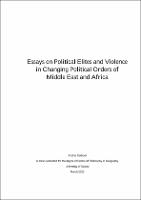Essays on Political Elites and Violence in Changing Political Orders of Middle East and Africa
| dc.contributor.author | Carboni, Andrea | |
| dc.date.accessioned | 2020-11-02T12:28:12Z | |
| dc.date.available | 2020-11-02T12:28:12Z | |
| dc.date.issued | 2020 | |
| dc.identifier | OCN: 1253408653 | |
| dc.identifier.uri | https://library.oapen.org/handle/20.500.12657/42790 | |
| dc.description.abstract | "This research project addresses the question of how political elites’ behaviour varies when competition among them is heightened. Focusing on changing political orders across Africa and the Middle East, it seeks to understand how political elites facing internal and external challenges manipulate local power structures for political survival purposes, resulting in distinct political trajectories. The thesis argues that local political and conflict environments are conditional on the nature of competition among elites. Volatile political transitions, intense popular unrest, and militarised environments all create distinct incentives and constraints which shape political orders, and determine the inclusion or exclusion of select elites in the resulting political settlement. Using a mixed-method research design which combines quantitative and qualitative methodologies, the thesis consists of five essays exploring select topics and three in-depth case studies. The essays address two cross-cutting themes. First, they show how elites reconfigure institutional structures to cement alliances and survive internal or external challenges when power is being contested after a change in the leadership, or when facing popular mobilisation. Bargaining occurs through ministerial appointments or purges which aim to consolidate political settlements and secure power holders from rivals. Examples from Tunisia and recent episodes of leadership changes from across Africa are presented together with original datasets of ministerial appointments. Second, the essays illustrate how patterns of violence within states are indicative of the fragmented nature of the political environment of the political competition therein taking place. Findings from Libya and Yemen are presented to demonstrate that localised fragmentation produce subnational geographies of conflict which reflect the strategies and the mobilisation capacity of armed groups and elite actors." | en_US |
| dc.language | English | en_US |
| dc.subject.classification | thema EDItEUR::J Society and Social Sciences::JP Politics and government | en_US |
| dc.subject.other | political elites | en_US |
| dc.subject.other | violence | en_US |
| dc.subject.other | Middle East | en_US |
| dc.subject.other | Africa | en_US |
| dc.subject.other | Yemen | en_US |
| dc.subject.other | politics | en_US |
| dc.title | Essays on Political Elites and Violence in Changing Political Orders of Middle East and Africa | en_US |
| dc.type | book | |
| oapen.relation.isPublishedBy | bdafb37b-14b7-4200-a181-96a60a7c8bef | en_US |
| oapen.relation.isFundedBy | 178e65b9-dd53-4922-b85c-0aaa74fce079 | en_US |
| oapen.collection | European Research Council (ERC) | en_US |
| oapen.pages | 221 | en_US |
| oapen.grant.number | 726504 | |
| oapen.grant.program | VERSUS | |
| oapen.grant.project | Violence and Elite Resilience in States Under Stress |

